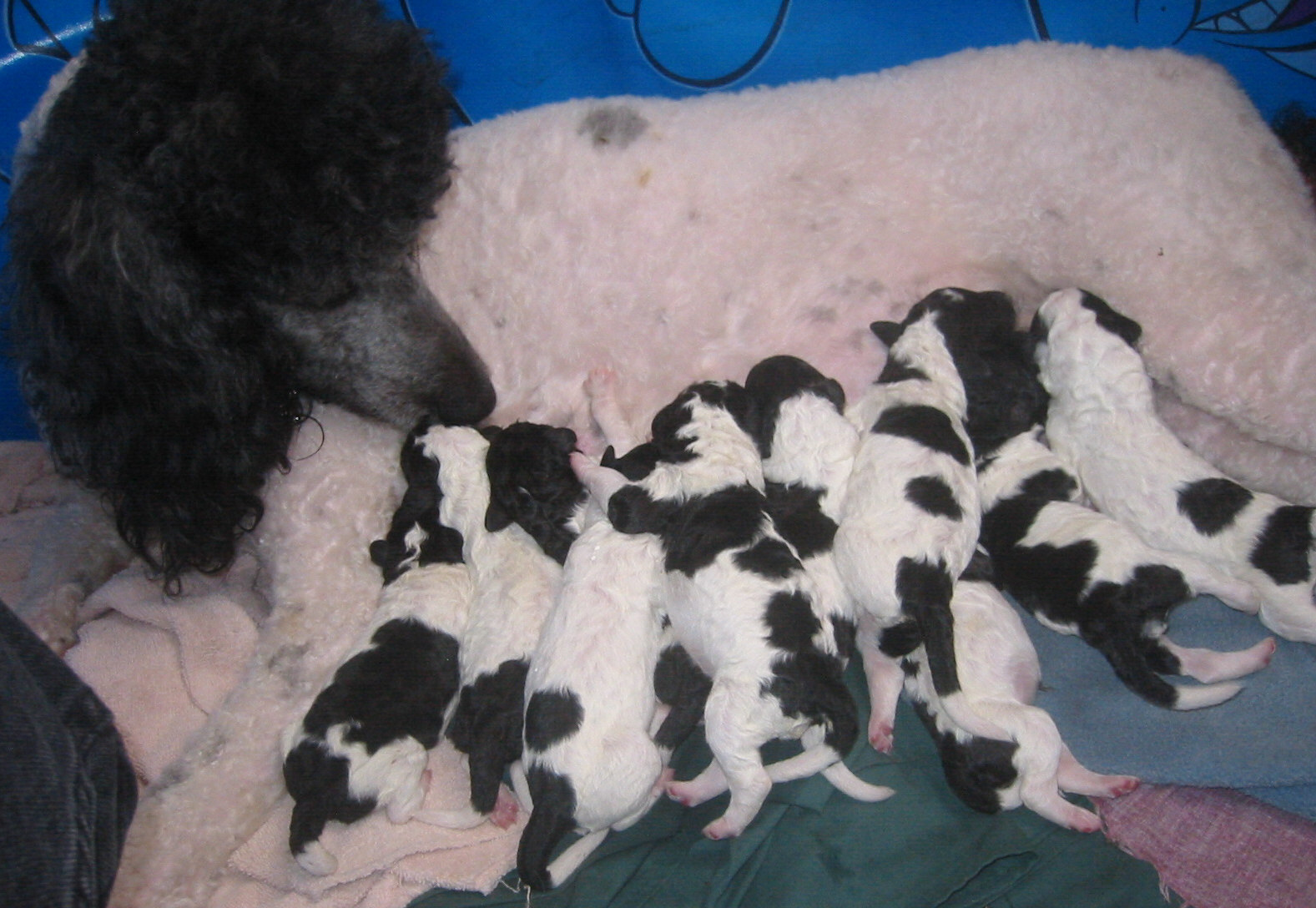 Understanding the cycle of worms, the differences between the four most common worms, how they infect our dogs, what the symptoms are, how they are diagnosed, how to protect our pups, and how to prevent and eliminate worms is a very complex subject. I will put this in the simplest terms yet provide all the information for practical purposes about worms that infect our puppies and dogs.
Understanding the cycle of worms, the differences between the four most common worms, how they infect our dogs, what the symptoms are, how they are diagnosed, how to protect our pups, and how to prevent and eliminate worms is a very complex subject. I will put this in the simplest terms yet provide all the information for practical purposes about worms that infect our puppies and dogs.

It is common for puppies to have worms. The worms are often passed through the mother’s milk to her nursing puppies, and even unborn pups can be infected. Puppies having worms is so typical that a veterinarian may prescribe or administer a dewormer when your puppy is only a few weeks old. Your puppy’s breeder should give you a deworming record for the puppy along with any vaccines or other medical information.
Always bring a stool sample with you to your dog’s vet appointment so that it can be tested for worms. If you ever notice worms or rice-like pieces in your dog’s stool, bring that to your vet for analysis to treat your dog appropriately.
HOOKWORMS
 Hookworm eggs travel through a dog’s intestines and out through his stool. Once the eggs are on the ground, they hatch and infect the next dog/host. That occurs by being absorbed through your dog’s skin, which can be his paws, belly, or any part of your dog that is touching the ground. Another way for your dog to become infected by hookworms is by cleaning/licking his paws, which may be coated with contaminated soil. Some puppies/dogs will be infected by eating the stool of another dog or by consuming infected rodents.
Hookworm eggs travel through a dog’s intestines and out through his stool. Once the eggs are on the ground, they hatch and infect the next dog/host. That occurs by being absorbed through your dog’s skin, which can be his paws, belly, or any part of your dog that is touching the ground. Another way for your dog to become infected by hookworms is by cleaning/licking his paws, which may be coated with contaminated soil. Some puppies/dogs will be infected by eating the stool of another dog or by consuming infected rodents.
Newborn puppies are also at risk of infection by hookworms, which can be passed from the mother through nursing and contaminated by the stool of littermates.
 One of the most essential pieces of information you need to know about Hookworms is that they do NOT live off the contents of your dog’s intestines. Hookworms have teeth and literally “hook on” to the intestinal wall and suck blood. If left untreated, this can be fatal, especially for young puppies. The photo on the right shows a Hookworm with three sets of teeth.
One of the most essential pieces of information you need to know about Hookworms is that they do NOT live off the contents of your dog’s intestines. Hookworms have teeth and literally “hook on” to the intestinal wall and suck blood. If left untreated, this can be fatal, especially for young puppies. The photo on the right shows a Hookworm with three sets of teeth.
It is also important to mention that Hookworms can also infect humans. I advise wearing shoes if walking in grassy areas where dogs frequently defecate.
ROUNDWORMS

Roundworms, unlike Hookworms, live off the intestinal contents of their host. One recognizable symptom of a puppy infected by Roundworms is the puppy’s sizeable round belly. There are two distinct types of Roundworms. The names are not important, but it’s essential to know the fact that one kind of Roundworm can only infect puppies/dogs, and the other can also infect kittens/cats. So, if you have felines in your home, you must have your veterinarian run a Roundworm species-specific test.
Roundworms infect dogs through the same methods as described above for Hookworms. Roundworms can be pretty large, six to seven (6-7) inches in length, and it is alarming to see them if they are in your puppy’s stool, possibly diarrhea or vomit.
Hookworms and Roundworms can migrate to the lungs and cause coughing and other respiratory symptoms. Additionally, Roundworm in the lungs can cause pneumonia.
Like Hookworms, Roundworms can also infect humans.
WHIPWORMS
 Whipworms are smaller than the other worms mentioned and live in your dog’s colon/large intestines. There they bite and embed their heads inside the colon tissue and suck the blood of their host. In great numbers, blood loss may not be a health issue, but it will cause inflammation and bloody, slimy diarrhea, which will become problematic.
Whipworms are smaller than the other worms mentioned and live in your dog’s colon/large intestines. There they bite and embed their heads inside the colon tissue and suck the blood of their host. In great numbers, blood loss may not be a health issue, but it will cause inflammation and bloody, slimy diarrhea, which will become problematic.
It is not common, but Whipworm can cause dehydration due to a lack of ability to maintain normal salt levels and may appear to be Addison’s disease. Testing for Addison’s will prove to be negative, and whipworm treatment will be successful.
Because it takes an average of three weeks for eggs to mature and infect another dog, feces are not how your dog can become infected. Self-grooming and contaminated soil are ways your dog can become infected with Whipworms.
Whipworms can also infect humans.
TAPEWORMS

Tapeworms are a different story. Tapeworms are from ingesting fleas. No, the flea doesn’t morph into a tapeworm. The flea carries a minute tapeworm that hasn’t grown an entire body yet. The minuscule head has hooks and suckers used to attach to the dog’s intestinal wall, where it will develop one of many attached tail segments. Each tail segment has an individual digestive system and reproductive tract. Unlike the Hookworm, the tapeworm thrives by absorbing the dog’s digested food through its skin. The tapeworm grows new segments closer to its head as the older segments fall off. The older segments, which look like a grain of rice and are flat, contain the eggs passed from the dog through defecation. The eggs themselves are not infectious.
Yes, humans can be infected by tapeworms. No, tapeworms do not make you hungry!
Heartworm medications can also prevent Hookworms, Roundworms, and Whipworms
Ask your veterinarian what the safest medications are for your dog.






